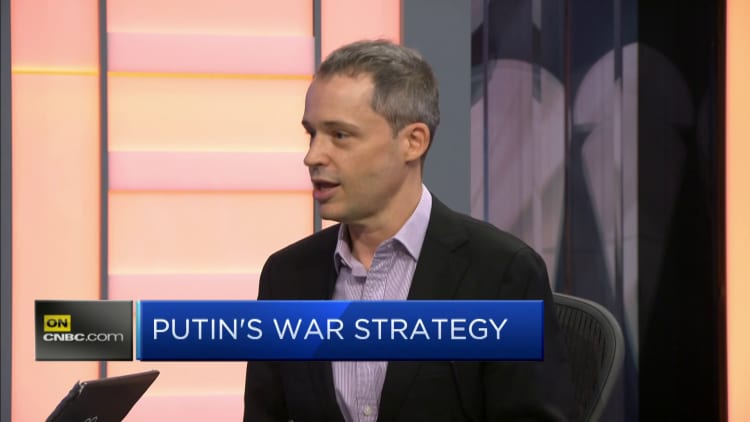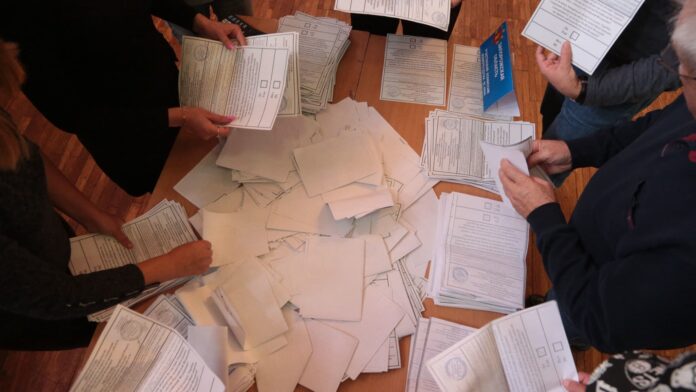Russian government regime at its ‘shakiest,’ says analyst
The current Russian government regime is the “shakiest we’ve seen,” said John Herbst, director of the Eurasia Center at the Atlantic Council.
Herbst told CNBC’s Squawk Box that Russian President Vladimir Putin’s call for a conscription has led to a “huge problem” demonstrating that Russians do not want to fight in Ukraine.
Putin announced a partial military mobilization in Russia last week, a move that triggered a wave of protests and mass arrests.
According to the director, even senior officials who are supportive of Putin are saying that his decision is a “disaster.” However, he predicts that Putin “is not going to go anytime soon.”
— Lee Ying Shan
Putin could look to turn the tide in the Ukraine war after sham referendums

CNBC’s Ted Kemp discusses the Russian-run “referendums” happening in four regions of Ukraine, and says President Vladimir Putin could use them to claim that Ukraine — instead of his invading Russian army — is the aggressor the war.
The results are out for four so-called referendums in occupied parts of Ukraine
Election commission members count votes of refugees from Russian-held regions of Ukraine for a referendum at a polling station in Simferopol, Crimea, on Sept. 27, 2022.
Stringer | Afp | Getty Images
After a series of sham referendums in four Russian-occupied parts of Ukraine, the results are out. Unsurprisingly, the results — widely seen as rigged, with a multitude of irregular voting practices reported — show a resounding majority voted to join Russia.
Amid widespread reports of coercive and illegal voting practices, electoral officials went door to door with portable ballot boxes to collect votes from residents living in the occupied Kherson and Zaporizhzhia regions in the south, and self-proclaimed, pro-Russian “republics” in Donetsk and Luhansk in the east. Polling stations were open only yesterday, the last day of voting.
The results came in last night from Russian-installed officials in the various regions, with Russian news agency Tass reporting that the votes in favor of joining the Russian Federation were as follows:
Donetsk “People’s Republic”: 99.23%
Kherson: 87.05%
Luhansk “People’s Republic”: 98.42%
Zaporizhzhia: 93.11%
Ukraine and its Western allies have denounced the so-called referendums and said they will not recognize the results.
It’s widely expected that Russian President Vladimir Putin will announce Friday that the occupied regions are being annexed and becoming a part of the Russian Federation.
There are widespread fears that the votes, and annexation, are designed to give Moscow a pretext to resort to nuclear weapons, to “defend” what it will claim is its territory and in a bid to win the war against Ukraine.
— Holly Ellyatt
Blinken says initial reports of damage to Nord Stream pipeline could be sabotage
US Secretary of State Antony Blinken speaks about US policy towards China during an event hosted by the Asia Society Policy Institute at George Washington University in Washington, DC, on May 26, 2022.
Jim Watson | AFP | Getty Images
U.S. Secretary of State Antony Blinken said that initial reports of apparent damage to the Nord Stream pipeline indicate it may be the result of sabotage.
“These are initial reports and we haven’t confirmed that yet,” Blinken told reporters at the State Department.
“Now, my understanding is the leaks will not have a significant impact on Europe’s energy resilience. And what’s critical is that we are working day in and day out both on a short-term basis and a long-term basis to address energy security for Europe and for that matter around the world,” Blinken added.
European officials, meanwhile, are investigating the unexplained leaks affecting both the Nord Stream 1 and 2 pipelines that bring natural gas from Russia to Europe via the Baltic Sea.
— Amanda Macias
Use of nuclear weapons is ‘absolutely unacceptable,’ NATO chief says
Stoltenberg has said NATO’s updated Strategic Concept will likely refer to Russia as the “most significant and direct threat” to security.
Anadolu Agency | Anadolu Agency | Getty Images
NATO Secretary General Jens Stoltenberg said that the alliance is taking Russia’s rhetoric and threats of using a nuclear weapon in Ukraine very seriously.
“Any use of nuclear weapons is absolutely unacceptable,” Stoltenberg said in his opening remarks before the European Parliament.
“It will change the nature of the conflict,” he said, adding that the NATO alliance, as well as the European Union, will impose severe consequences on Russia if it uses a nuclear weapon.
The Kremlin has previously said that it has a “right” to use nuclear weapons if its territory is threatened.
— Amanda Macias
CIA reportedly warned Berlin about possible attacks on gas pipelines
Russia has drastically reduced gas supplies to Europe in recent weeks.
Odd Andersen | Afp | Getty Images
The U.S. Central Intelligence Agency had weeks ago warned Germany about possible attacks on gas pipelines in the Baltic Sea, German magazine Spiegel said after gas leaks in Russia pipelines to Germany were reported.
The German government received the CIA tip in summer, Spiegel reported, citing unnamed sources, adding that Berlin assumes a targeted attack on Nord Stream 1 and 2 pipelines.
A German government spokesperson declined to comment, Spiegel added.
— Reuters
Nord Stream leaks ‘a severe safety and environmental hazard,’ analysts say
Workers are seen at the construction site of the Nord Stream 2 gas pipeline, near the town of Kingisepp, Leningrad region, Russia, June 5, 2019.
Anton Vaganov | Reuters
Suspicious leaks reported on the Nord Stream pipelines from Russia to Germany represent a “severe safety and environment hazard,” according to experts at the Eurasia Group.
Nord Stream operator Nord Stream AG reported Tuesday that both the Nord Stream 1 and 2 pipelines have sustained “unprecedented” damage via three known leaks, adding it was impossible to estimate when the gas network system’s working capability would be restored.
Danish and Swedish authorities declared a no-shipping zone around the location of the suspected leak in their maritime zones while Denmark raised its power and gas safety alert level.
Henning Gloystein, director of energy, climate and resources and senior analyst Jason Bush, both at Eurasia Group, said in a note Tuesday that while German and Danish authorities said the cause of the leaks was unknown, “unplanned leaks to undersea pipelines are rare as they are designed to avert accidental damage.”
“Several EU sources said sabotage seemed likely. Neither pipeline was delivering commercial gas at the time of the leaks, yet given both lines were still pressured and each has the capacity to pipe around 165 million cubic metres of methane-heavy gas per day,” they said, adding: “Leaks of this size are a severe safety and environmental hazard, especially should Russia not stop pumping gas into the system.”
The Nord Stream 1 and 2 pipelines have centered heavily in the breakdown of relations between Europe and Russia because of the war in Ukraine. The new Nord Stream 2 pipeline had not even opened when the German government refused to certify it for commercial operations after Moscow’s invasion of Ukraine.
Meanwhile, the functional Nord Stream 1 pipeline is currently not being used to deliver Russian gas to Europe after Gazprom, the Russian gas giant, said there was a technical fault with a turbine that could not be fixed due to Western sanctions.
The latest report of leaks make it even less likely that gas supplies to Europe will resume before the winter, analysts now say.
“Depending on the scale of the damage, the leaks could even mean a permanent closure of both lines,” Eurasia Group said.
Gazprom declined to comment when approached by Reuters.


